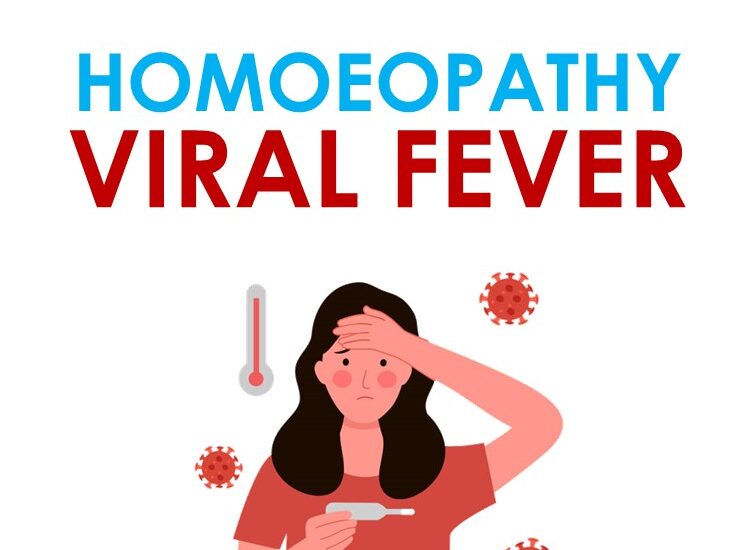The Role of Homeopathy in Treating Viral Fevers: A Critical Overview
Introduction
Homeopathy is a system of alternative medicine that has been in practice for over two centuries. Developed by Samuel Hahnemann in the late 18th century, it is based on the principle of “like cures like,” where substances that cause symptoms in a healthy person are believed to cure similar symptoms in a sick person when administered in very small doses. Over the years, homeopathy has gained both popularity and criticism, particularly in the treatment of viral fevers. This blog explores the use of homeopathy in managing viral fevers, delving into its efficacy, safety, and the debates surrounding its practice.
Understanding Viral Fevers
Viral fevers are a common symptom of various infections caused by viruses. Unlike bacterial infections, viral infections do not respond to antibiotics, and treatment typically focuses on alleviating symptoms while the body’s immune system fights off the virus. Symptoms of viral fever can include a high temperature, body aches, fatigue, and sometimes a rash or cough, depending on the virus involved. Common viral infections that lead to fever include the flu, common cold, dengue, and COVID-19.
Homeopathic Approach to Viral Fevers
Homeopathy offers a range of remedies that practitioners claim can treat viral fevers by enhancing the body’s natural healing processes. Some of the commonly prescribed homeopathic remedies for viral fevers include:
- Aconitum napellus: Often used in the early stages of fever, especially if the fever comes on suddenly after exposure to cold or windy weather. It is also suggested for fevers accompanied by anxiety.
- Belladonna: Recommended for high fevers that come on suddenly, often with redness, throbbing headaches, and sensitivity to light or noise.
- Eupatorium perfoliatum: Known as the “bone-setter,” it is used for fevers associated with intense body aches, particularly in cases of dengue fever.
- Gelsemium: Suggested for flu-like symptoms, including fever with weakness, chills, and drowsiness.
- Rhus toxicodendron: Often prescribed when fever is accompanied by restlessness and muscle aches, particularly if the symptoms are worse during rest.
Efficacy and Evidence
The efficacy of homeopathy in treating viral fevers is a contentious topic. Advocates of homeopathy argue that it is a safe, gentle, and natural form of treatment that can boost the immune system without the side effects associated with conventional medicines. However, the scientific community remains largely skeptical.
- Lack of Scientific Consensus: Numerous studies have attempted to assess the efficacy of homeopathic treatments for viral fevers, but results have been inconclusive or show no significant benefit over placebo. A systematic review published in the British Journal of Clinical Pharmacology highlighted that many studies supporting homeopathy’s efficacy suffer from methodological flaws, such as small sample sizes or lack of rigorous controls .
- Placebo Effect: The placebo effect is a significant factor in the perceived effectiveness of homeopathy. Many patients report feeling better after taking homeopathic remedies, but this improvement may be due to the psychological belief in the treatment rather than any physiological effect of the remedy itself .
- Safety and Side Effects: One of the key arguments in favor of homeopathy is its safety profile. Homeopathic remedies are highly diluted, which means they are unlikely to cause harm. However, critics argue that relying on homeopathy for serious conditions like viral fevers, especially when conventional medical treatment is necessary, can delay appropriate care and lead to complications .
Homeopathy in the Context of Modern Medicine
While homeopathy remains popular among certain segments of the population, it is important to recognize its limitations, especially in the context of treating viral fevers. Modern medicine, including vaccinations and antiviral drugs, has been proven effective in preventing and managing viral infections. The World Health Organization (WHO) and other leading health authorities do not recommend homeopathy as a treatment for serious viral infections, such as COVID-19 or influenza .
Conclusion
Homeopathy continues to be a widely used alternative treatment for viral fevers, particularly among those seeking natural or holistic approaches to health. However, its efficacy remains unproven by rigorous scientific standards, and it should not replace conventional medical treatments, especially in serious cases. Patients interested in homeopathy should consult with qualified healthcare professionals to ensure that it is used safely and appropriately alongside other necessary medical care.
References
- Ernst, E. (2010). “A systematic review of systematic reviews of homeopathy.” British Journal of Clinical Pharmacology, 54(6), 577–582. Link
- Shang, A., et al. (2005). “Are the clinical effects of homoeopathy placebo effects? Comparative study of placebo-controlled trials of homoeopathy and allopathy.” The Lancet, 366(9487), 726-732. Link
- World Health Organization. (2009). “Safety issues in the preparation of homeopathic medicines.” WHO Press. Link
- Mathie, R. T., et al. (2014). “Randomised placebo-controlled trials of individualised homeopathic treatment: systematic review and meta-analysis.” Systematic Reviews, 3, 142. Link
This blog is intended for informational purposes only and should not be considered as medical advice. Always consult with a healthcare professional before starting any new treatment regimen.
this Content write by use of Chatgpt











